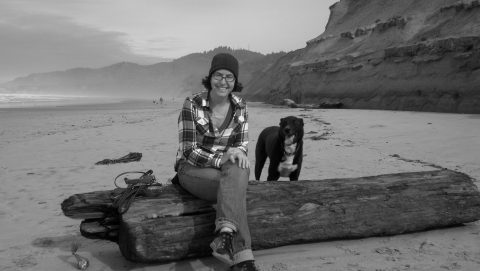What themes do you frequently find yourself writing about?
I can be all over the map with this! I’d say my writing projects can fall into a couple of categories: whatever is breaking my heart at the current moment, and/or when a particular concept or image pops up in a way that makes me excited to play with words or explore it from an unexpected angle. Since my dad was diagnosed with Alzheimer’s a few years ago I’ve been thinking a lot lately about language and memory and storytelling and childhood and parenthood and loss and how best to weave these strands together into a coherent whole.
As an obsessive thinker, I can turn a potential story over and over in my head for months before it finds its way onto the page. I love coming across writing that makes me see the world in new ways, and I’m always hopeful that whatever images or structure I use may inspire a similar “Ooohh, you can DO that?” light bulb response from a future reader out there.
You write both fiction and creative nonfiction. Can you tell us a little about how you move between the two genres? Do you have a favorite?
As a reader I enjoy both genres, though I’m able to “lose myself” more reading fiction. I’m a total process geek, so I’m drawn to pieces that are inventively structured, have a strong voice, or take narrative risks, regardless of genre. I don’t always know when I sit down to write what form will best serve the story and resonate with others, and figuring that out is part of the fun.
Both fiction and CNF borrow from each other in ways that defy our attempts to categorize them. I think of myself as primarily a fiction writer although many of my real-life obsessions find their way into my stories. I do think the CNF tag can lead some readers to assume they know more about the writer based on one piece than they might reading or responding to the same piece as fiction. I’ve felt more comfortable exploring certain aspects of my experience through the added layers that fiction permits.
I decided to remove some of those layers in a recent piece about my dad’s Alzheimer’s, partly to push back against public stigma surrounding the disease. But even that piece has fictional elements. I take on perspectives outside of my own: it’s not just the daughter’s POV–the mother and father speak as well. There is quite a bit of invention in that narrative choice and I considered submitting it as fiction before deciding to send it out as CNF. There’s power in saying “this is my experience,” as terrifying as that is, and I’m learning to sit with my vulnerability in this regard.
You served as the interview editor for Late Night Library from 2014-2017. What makes for a good interview?
I love interviews that have the feeling of a conversation between peers and also make space for the reader. I always appreciate when interview questions provide some context for those who haven’t read the work, and when they genuinely engage with the work rather than rehashing promotional copy or questions that have been covered in previous interviews. I love the artist-to-artist conversations in BOMB Magazine, particularly when they cross disciplines, because they always leave me excited about the creative process and ready to dive back in with fresh eyes.
The author interviews I did for Late Night Library were by email, which had the advantage of letting everyone be introverted and take our time crafting thoughtful questions and responses. My favorite interviews were those in which we had time for two or even three exchanges of questions, as opposed to sending the full set questions at once. That exchange felt more dynamic on the page and took the conversation in directions I couldn’t have anticipated. That said, I never quite lost the terror of sending off a first batch of questions and waiting for the response.It felt nerve-wracking every time, but it was a pleasure and privilege to have these conversations, especially in support of emerging writers.
Last but not least: what kind of story would you love to see in the queue this week?
Surprise me with your best! That sounds trite, I know, but I’m continually amazed by the diversity of styles and subjects that flash encompasses. I love how some flash writers are capable of sophisticated world building and others use the form to zoom in beautifully on some microscopic detail. I love a well-executed narrative risk,I love a strong, compelling voice, I love dark humor and playfulness of form, but mostly I love work that takes me completely out of myself. Those of you who can do this in under 1,000 words are magicians.
Simply said, I’m always interested in seeing what writers decide to grapple with on the page. We all want to be seen, so write what feels vitally important to you right now. What delights you? What keeps you up at nights? What distracts you from your day job? I’ll be on the other end of the queue, ready to find out.


 The core workshop of SmokeLong Fitness is all in writing, so you can take part from anywhere at anytime. We are excited about creating a supportive, consistent and structured environment for flash writers to work on their craft in a community. We are thrilled and proud to say that our workshop participants have won, placed, or been listed in every major flash competition. Community works.
The core workshop of SmokeLong Fitness is all in writing, so you can take part from anywhere at anytime. We are excited about creating a supportive, consistent and structured environment for flash writers to work on their craft in a community. We are thrilled and proud to say that our workshop participants have won, placed, or been listed in every major flash competition. Community works.